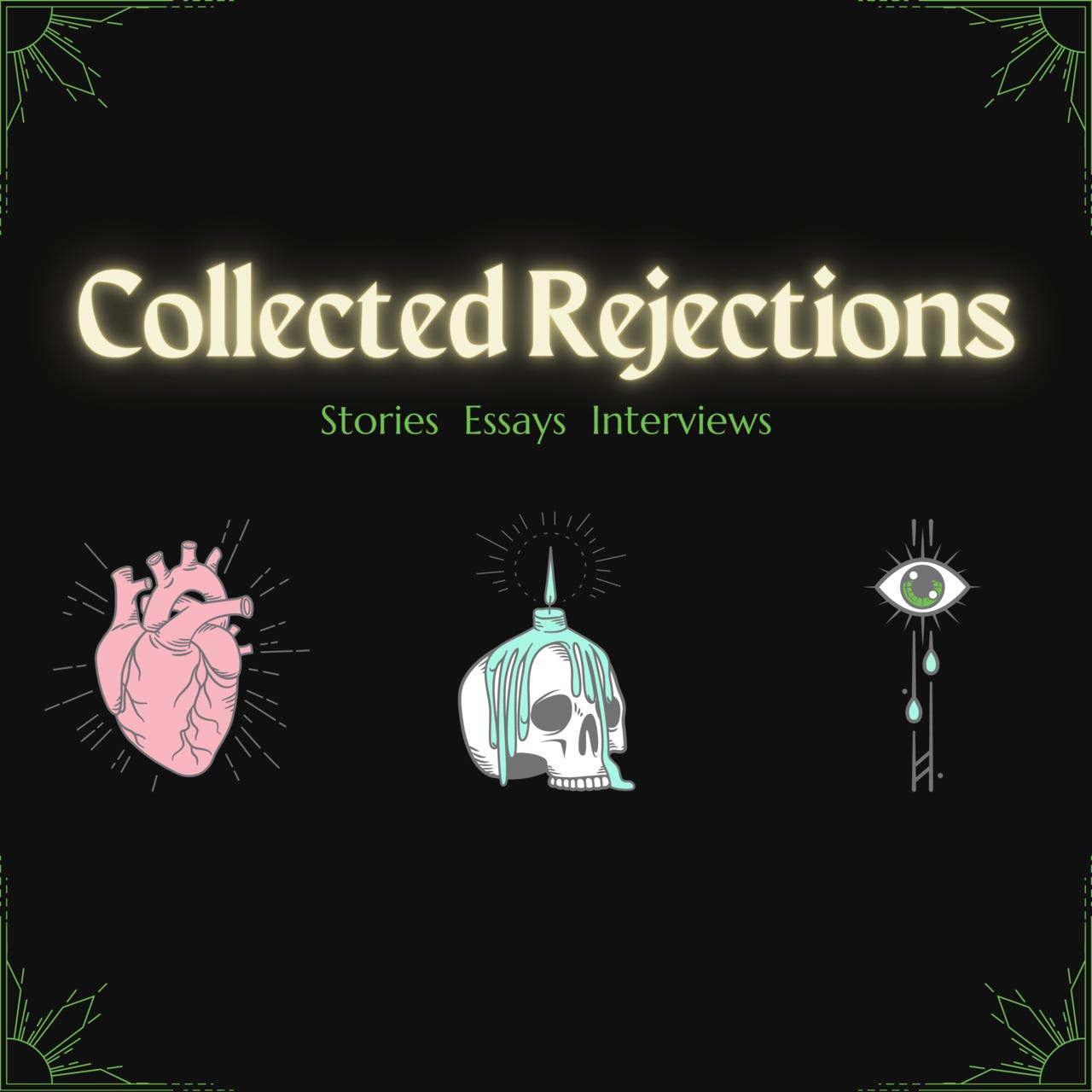Hi everyone,
I still can’t believe the amazing response to my last essay “Who are we conforming for?” You all really showed up for each other in the comments, having an incredible discussion about conforming and creative expression. It was really lovely. If you haven’t yet, check that one out.
Last week I also tried out an accountabilibuddy thread, and it seems like you all loved it. I haven’t repeated it this week, but I will next week in the chat feature. So if you haven’t downloaded the Substack app yet, get on that.
Other than that, I’ve just been healing up from breaking my rib on Sunday the 15th. It’s been absolute chaos trying to exist when I can’t pick up more than 1 pound of weight at a time.
How have you all been? Drop what’s holding you back in the comments.
Okay, on with the show!
Every once in a while, I get an email or a reply to a tweet that is so mean, so unfair, so far out of left field, that I think to myself, "Wow, you sure did this on purpose. You deliberately went out of your way to take what I wrote in the worst way possible."
Twitter is moldering with this behavior. It's nothing new, of course; history is full of exasperated people wondering why their enemies deliberately twisted their every word. It has happened in the past and I’m sure that it will (unfortunately) keep happening in the future.
This behavior is called reading in bad faith.
(It's also called 'being a little bit of a dick.')

Bad faith readers are people who are always going to assume the worst of what anyone writes. They search out ambiguous phrases, hot-button words, and tangential ideas, then twist them into moral or intellectual failures of the author. Sometimes they're just taking an idea out of context; sometimes they're maliciously twisting it beyond recognition.
If you are a human who writes and allows anyone else to read your writing, you will encounter bad-faith readers. It happened to me with my tweet about climate change that went viral. One night I was making a silly little joke about semantics and the next morning I was fending off a flood of tweets disparaging me, my mother, and my mother's mother as stupid idiots who wouldn't understand science or religion or Santa Claus if he and Jesus came down my chimney and beat me to death with a chemistry textbook. It was... astonishing.

Had that happened to me even a few years earlier, I probably would have deleted my whole Twitter and gone into hiding. Luckily I was already thirty and tired so I mostly just ignored them all until they got bored and left me alone.
It could have been scary though. I don't blame people who delete and lockdown when their tweets go viral--the mob is scary.
But sometimes, people live in that fear. It becomes consuming, dominating. They get so afraid of their work being interpreted badly that they don't put their work out there at all.
And we can't have that. Not if we're going to live our fullest lives as our most creative selves.
So, how do you spot bad faith readers?
If you're a human adult, you've already interacted with at least one of these people. It might have been a family member, a boss, a friend of a friend--someone who believed you could do no right. Even your most well-intentioned nicest gesture was taken badly.
Bad faith readers aren’t people who just didn’t like your work. You and your work are not for everyone. And that’s good! If you aren’t encountering people who don’t like your creative expression, you aren’t either encountering enough people, or your work is milk toast and not saying something.
Bad faith readers are the commenters on Goodreads who call you a Nazi because your novel so much as mentions Germany in the 1940s--even if it's set in an alternate reality where Hitler was killed during the Beer Hall Putsch and the Holocaust never occurred.
Bad faith readers are the people who don't follow you on Twitter but suddenly quote-tweet your vague 8 am tweet about feeling sick and use it to call you an alcoholic and a drug addict and a bad parent.
Bad faith readers are the people boycotting your research because it didn't explain in detail the daily lives of enslaved women living in South Carolina in 1830...because your article was about single moms in New York in the 1890s.
Basically, bad faith readers are the ones criticizing your work without actually engaging with it. Their criticism often has little to no ground in what you've actually written. For instance: The daily lives of enslaved women in South Carolina is a good topic and it deserves further examination, but if you're writing 1000 words on single moms in New York after slavery was abolished, that might not be the right place for that other conversation. It’s not on topic, and bringing it up means half-assing two subjects instead of whole-assing one.
You can check if someone is reading your work in bad faith in a few simple steps:
Compare their criticism to your work's central idea. Do they even match up? If what they're criticizing is not even the point of what you wrote, you might be dealing with someone reading in bad faith.
Check for comprehension. Is it possible that they're confused? Was something you wrote complicated, or unclear? If not, then they might be reading it in bad faith.
Consider the venue. Did they quote tweet you? Or did they email you privately? Usually, someone who approaches you privately means well and is saying something because they think it's right. And conversely, when someone is doing it in public, it's usually to score points at your expense. Neither is necessarily an indicator of good or bad faith (the people DMing me telling me to kill myself are not acting in good faith), but it's a quick way to get a base-level assessment.
For the record: I am not saying that every criticism you receive is someone reading your words in bad faith. I have also received plenty of very valid criticism! I, like all humans that have ever existed or will ever exist, make mistakes all the time. Here's what we do when we receive valid criticism: Apologize, fix it if possible, make a mental note of where things went wrong, and move on. That's all. We don't lash out, we don't beat ourselves up, and we don't allow it to stop us from ever trying again.
What do we do with bad faith readers?
Take a deep breath.
Take another one.
Okay.
Please don't argue with them. Really, you'll tire yourself out. If someone is deliberately reading your writing in bad faith, they're going to read your arguments in bad faith too.
Try to find a way to ignore them. The thing bad faith readers want most is to provoke you, to get you to say something out of hurt or anger or shock that then proves them right. They would love nothing more than for you to respond and say something even vaguely mean that they can twist out of context for their own purposes.
You might think silence is worse. Your sense of integrity or honor or self-protection might be flaring up and saying that this attack on your reputation or intelligence or work cannot stand! And I totally get that, and there’s a time and place for returning an attack. (Hint: It’s mostly when lawyers are agreeing that a statement is libel or defamation.) Most of the time, hitting back is only going to invite the mob in further. It’s blood in the water and they are sharks. With rabies. Who are starving.
(Can sharks get rabies? I simply will not look it up because the imagery is more important. No one answer me.)
On social media, I tend to mute these people. I do not block them unless they keep retweeting stuff and encouraging their followers to harass me. If you block them, they'll be able to tell they've been blocked, and that gives them both satisfaction that they've upset you and more fodder to use for criticism. They can't tell when they've been muted.
It's normal to feel hurt or embarrassed or scared when these sorts of reactions show up in your life. I almost always do. But don't act out of those feelings. Wait until the first flush of it has faded, when you're thinking clearly, then decide what to do.
Remind yourself: This behavior is more about them than it is about you. You are the unlucky person in their sights today, and tomorrow or next week it will be someone else. If you want to, feel sad for them--it must be lonely to move through life so antagonistically.
Next: Count yourself in good company. Literally every famous person goes through this at some point in their life. Distract yourself from these readers by going to see how your favorite celebrity dealt with this. Or, heck, just go look at pictures of your favorite baby animal.
Do whatever you need to in order to self-soothe after dealing with them, then sit down and keep creating. Don't let them scare you off. The world needs your work.
Reminder: These voiceovers will go behind a paywall starting next week, along with a lot of other fun features. If you upgrade before January 31, you can get an annual plan for 20% off!
If you liked this post but can’t commit to a subscription, I get it! You can tip me, as a treat.
Want more of my work? This week on my podcast, Unruly Figures, I posted part two of the story of Catherine de Medici, the Renaissance Queen of France who has been long maligned by historians as a poisoner. Together, we’re going to reclaim the Serpent Queen.
I haven’t been writing much at all lately while I grieve my father’s passing. But, a piece I wrote last October went live last week on Sprudge: When Coffee Becomes a Religious Experience. It explores the varied relationship coffee has had with religions around the world, and I had so much fun researching and writing it.
Last week I published my first book review here. I’d love to hear what you think:
Finally, if you liked this and think your friends might too, please forward it on! That’s how we all discover new fun things, right?









An excellent article. I abide by the adage 'don't feed the trolls'
Interestingly enough, I am working on an article that includes a bunch of people interpreting something I wrote in the worst possible way. I asked the editor if he thought perhaps I hadn't expressed myself very well, but he reassured me that I had. It was clear that these people had read a tweet about the article but not the article itself. As you say, no point in arguing with such people because they'd only read your arguments in bad faith too. I love that description btw.
Sorry about your dad. You look after yourself Valorie.
Excellent post